The Second Conditional «If I met a genie,


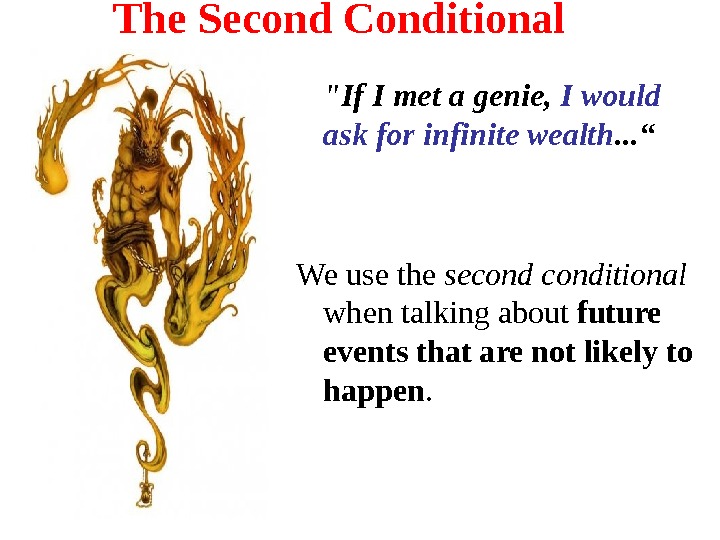
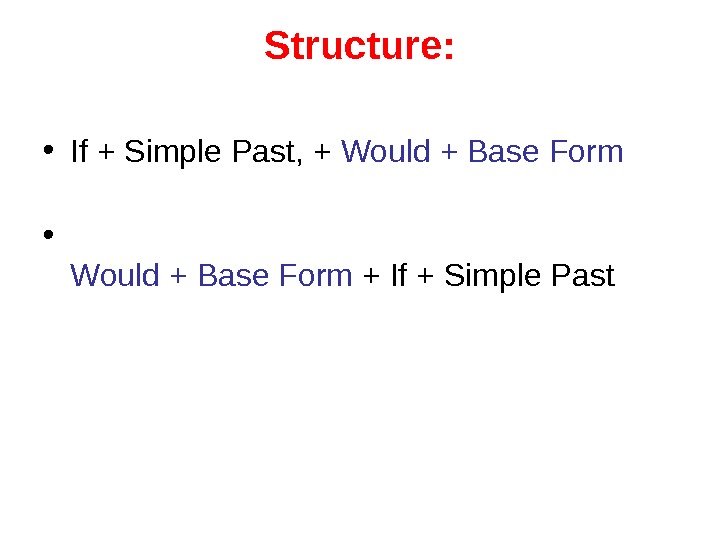
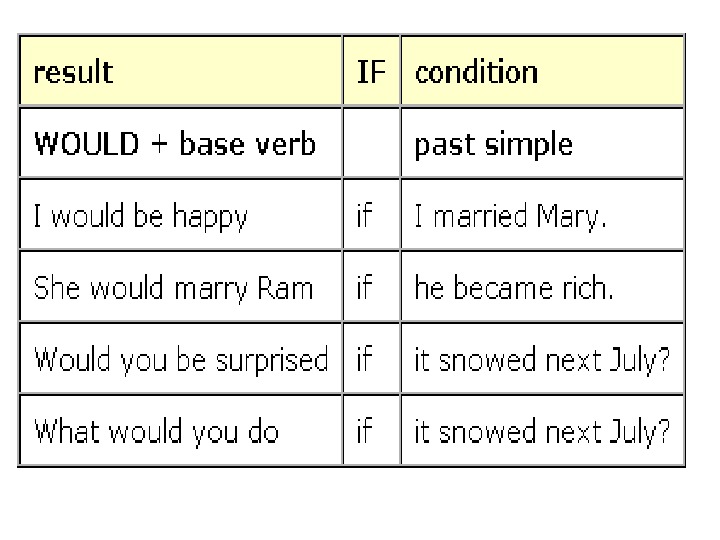
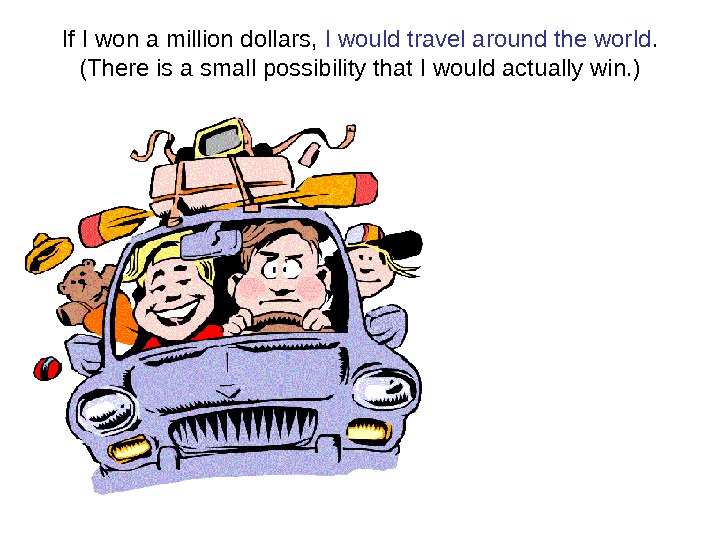
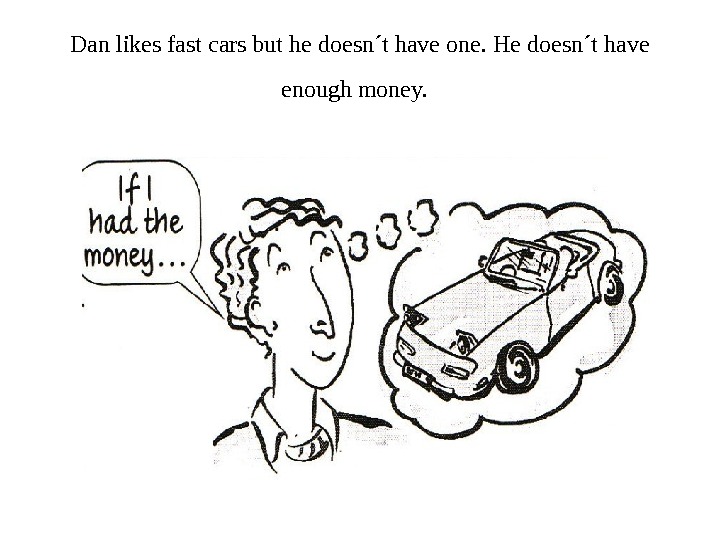
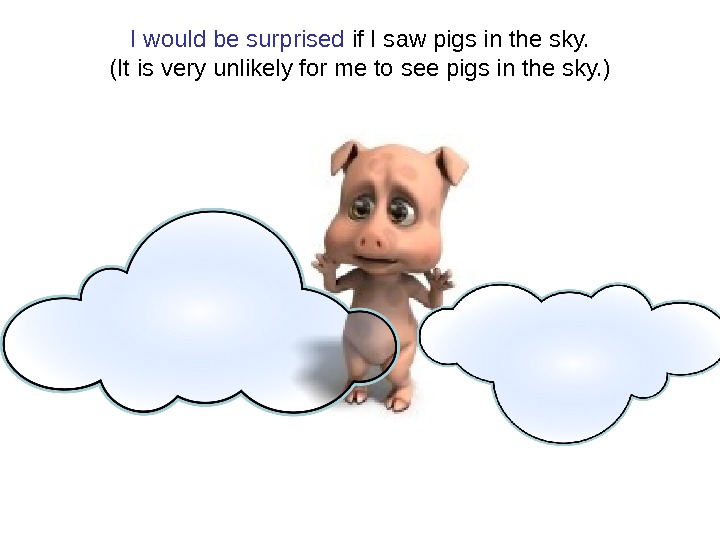

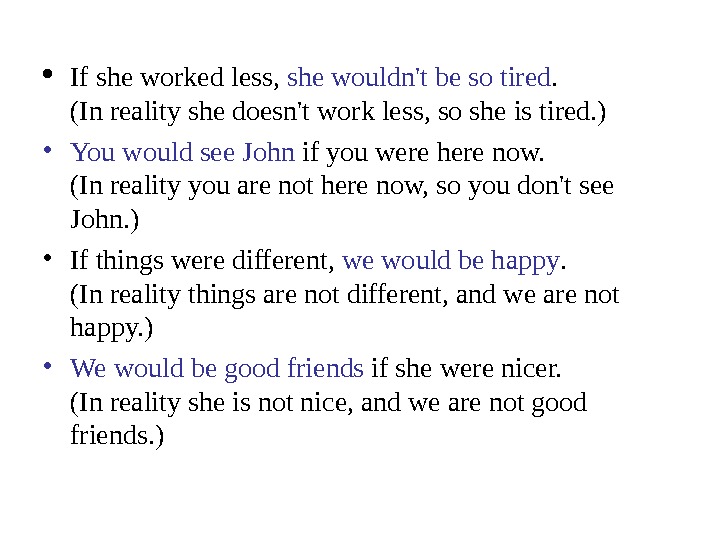
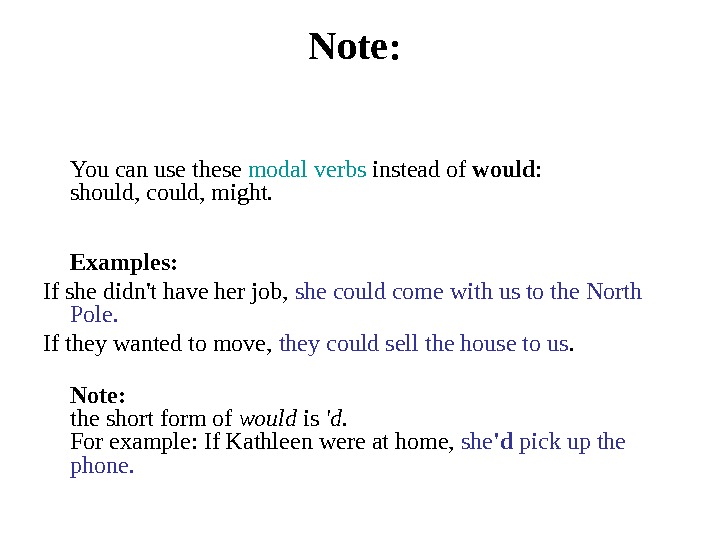
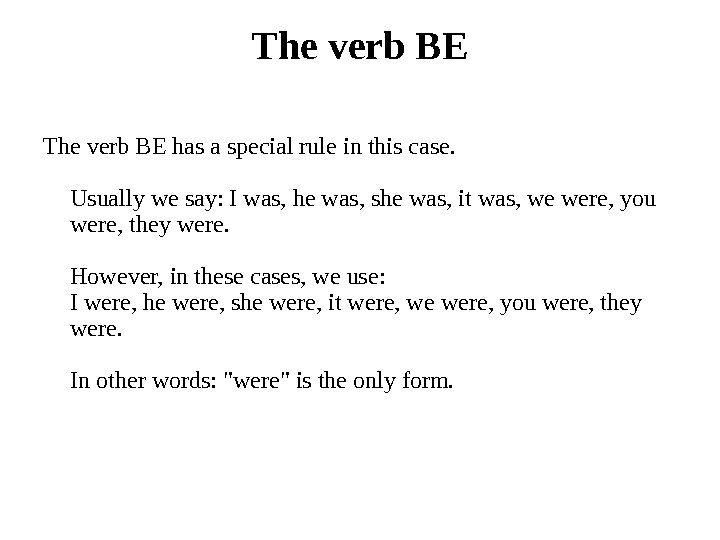
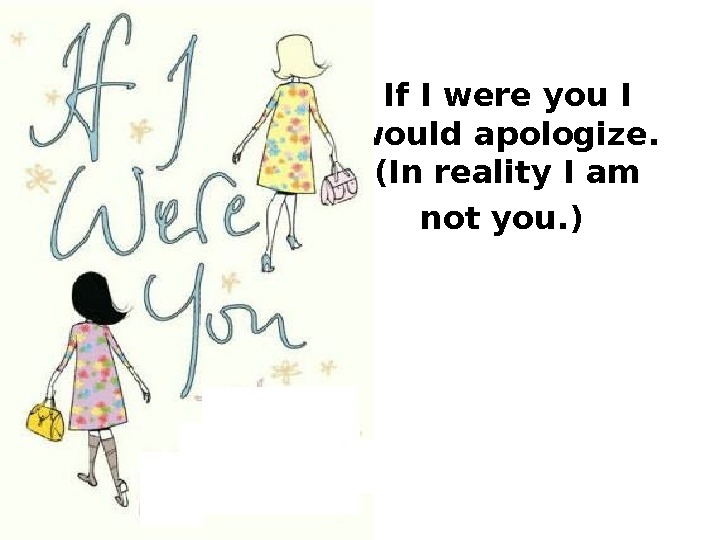
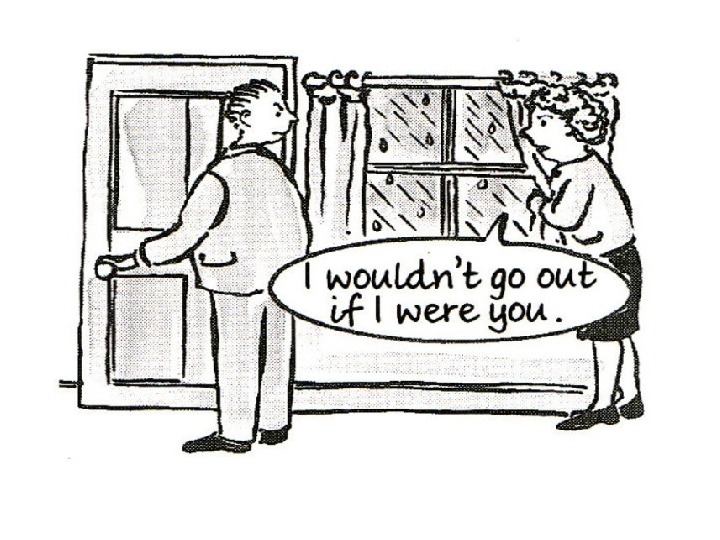

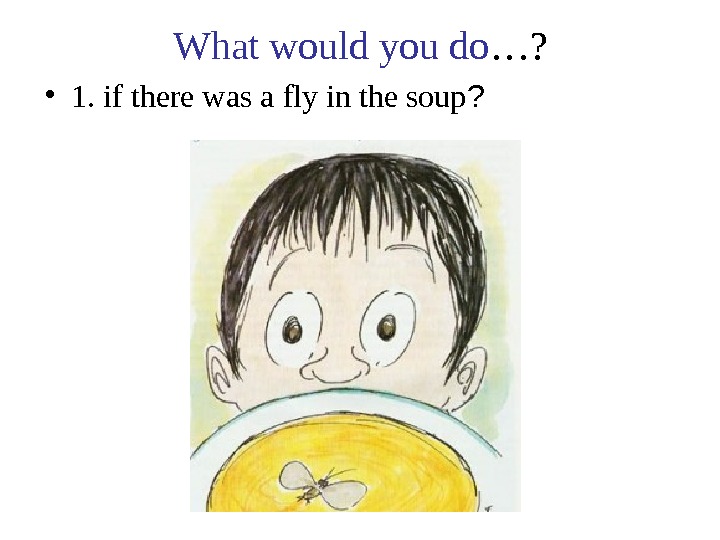
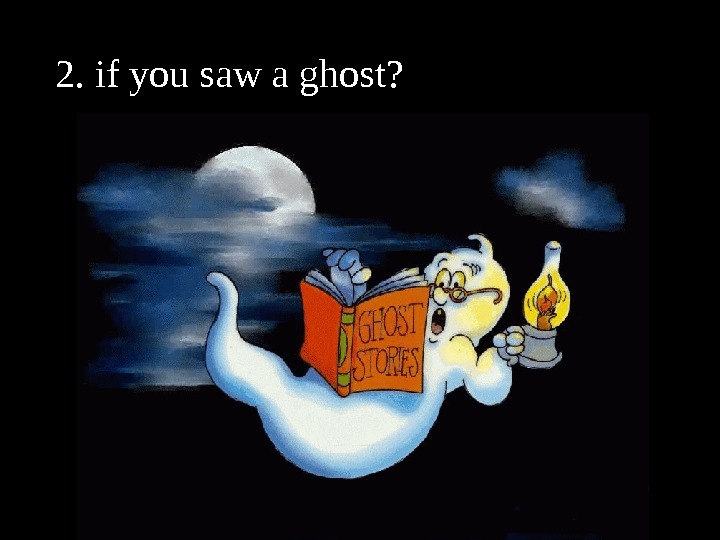
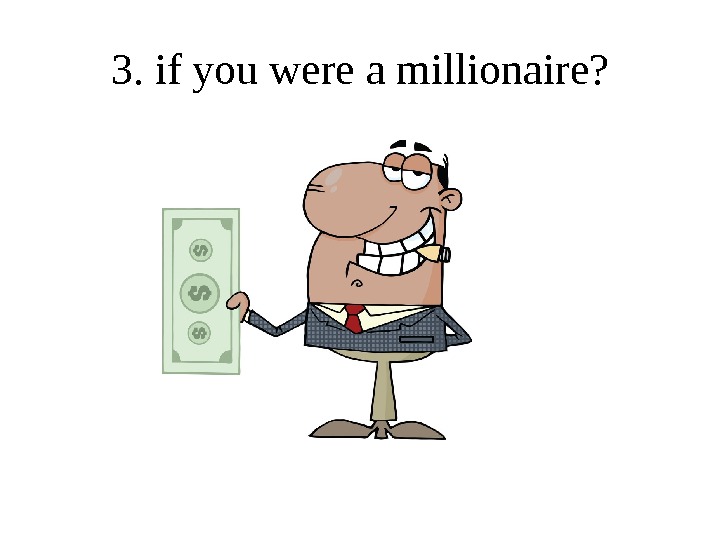

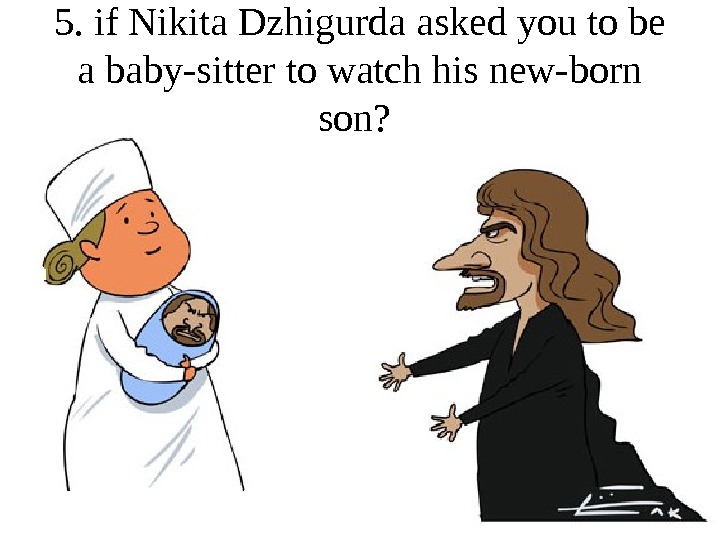

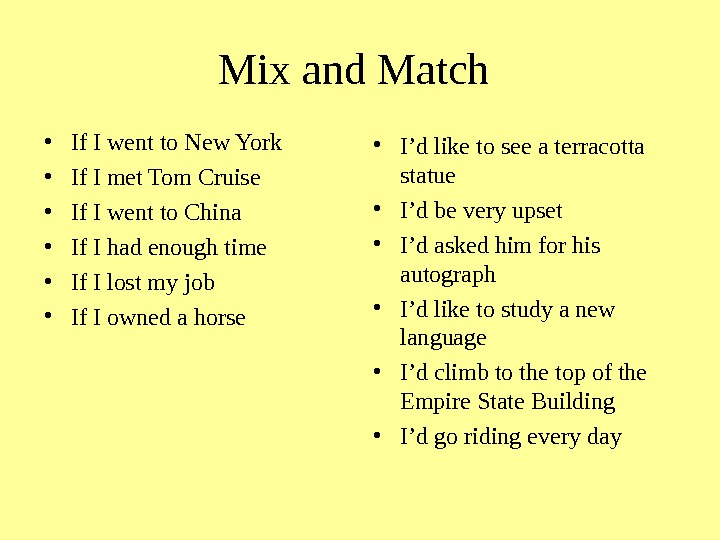

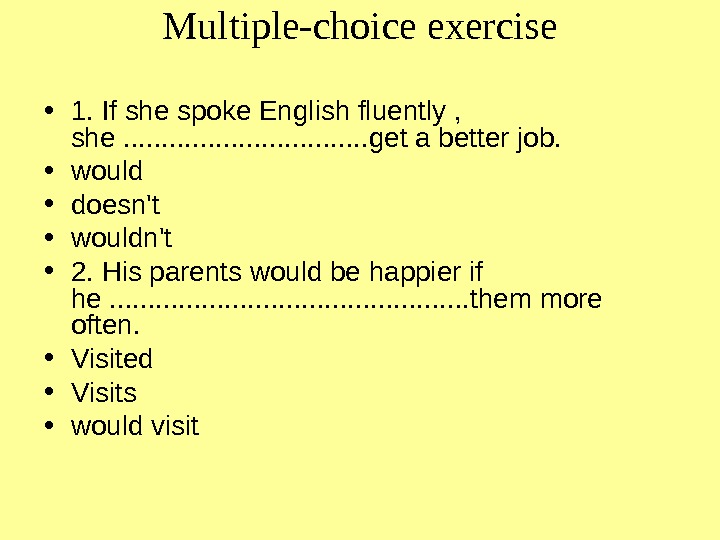
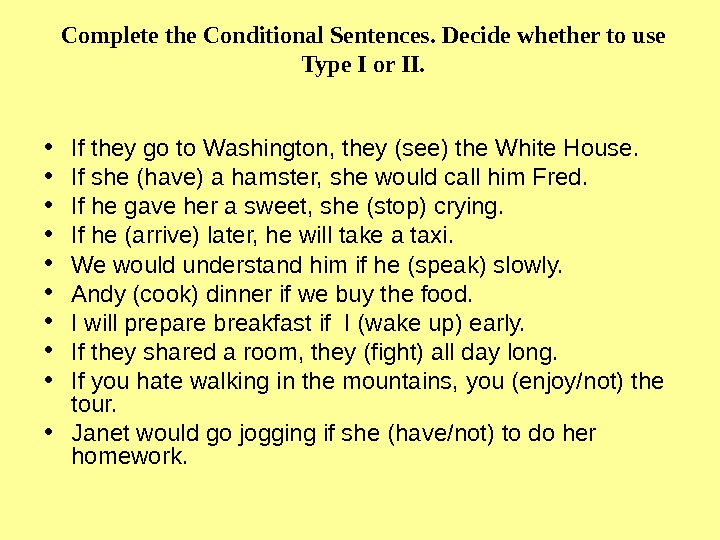
- Размер: 1.6 Mегабайта
- Количество слайдов: 24
Описание презентации The Second Conditional «If I met a genie, по слайдам

 The Second Conditional «If I met a genie, I would ask for infinite wealth. . . “ We use the seconditional when talking about future events that are not likely to happen.
The Second Conditional «If I met a genie, I would ask for infinite wealth. . . “ We use the seconditional when talking about future events that are not likely to happen.
 Structure: • If + Simple Past, + Would + Base Form • Would + Base Form + If + Simple Past
Structure: • If + Simple Past, + Would + Base Form • Would + Base Form + If + Simple Past

 If I won a million dollars, I would travel around the world. (There is a small possibility that I would actually win. )
If I won a million dollars, I would travel around the world. (There is a small possibility that I would actually win. )
 Dan likes fast cars but he doesn´t have one. He doesn´t have enough money.
Dan likes fast cars but he doesn´t have one. He doesn´t have enough money.
 I would be surprised if I saw pigs in the sky. (It is very unlikely for me to see pigs in the sky. )
I would be surprised if I saw pigs in the sky. (It is very unlikely for me to see pigs in the sky. )
 We also use the seconditional when talking about things which are contrary to the present facts. «If I had any money, I would give you some. «
We also use the seconditional when talking about things which are contrary to the present facts. «If I had any money, I would give you some. «
 If she worked less, she wouldn’t be so tired. (In reality she doesn’t work less, so she is tired. ) • You would see John if you were here now. (In reality you are not here now, so you don’t see John. ) • If things were different, we would be happy. (In reality things are not different, and we are not happy. ) • We would be good friends if she were nicer. (In reality she is not nice, and we are not good friends. )
If she worked less, she wouldn’t be so tired. (In reality she doesn’t work less, so she is tired. ) • You would see John if you were here now. (In reality you are not here now, so you don’t see John. ) • If things were different, we would be happy. (In reality things are not different, and we are not happy. ) • We would be good friends if she were nicer. (In reality she is not nice, and we are not good friends. )
 Note: You can use these modal verbs instead of would : should, could, might. Examples: If she didn’t have her job, she could come with us to the North Pole. If they wanted to move, they could sell the house to us. Note: the short form of would is ‘d. For example: If Kathleen were at home, she ‘d pick up the phone.
Note: You can use these modal verbs instead of would : should, could, might. Examples: If she didn’t have her job, she could come with us to the North Pole. If they wanted to move, they could sell the house to us. Note: the short form of would is ‘d. For example: If Kathleen were at home, she ‘d pick up the phone.
 The verb BE has a special rule in this case. Usually we say: I was, he was, she was, it was, we were, you were, they were. However, in these cases, we use: I were, he were, she were, it were, we were, you were, they were. In other words: «were» is the only form.
The verb BE has a special rule in this case. Usually we say: I was, he was, she was, it was, we were, you were, they were. However, in these cases, we use: I were, he were, she were, it were, we were, you were, they were. In other words: «were» is the only form.
 If I were you I would apologize. (In reality I am not you. )
If I were you I would apologize. (In reality I am not you. )

 Writing exercises
Writing exercises
 What would you do …? • 1. if there was a fly in the soup ?
What would you do …? • 1. if there was a fly in the soup ?
 2. if you saw a ghost?
2. if you saw a ghost?
 3. if you were a millionaire?
3. if you were a millionaire?
 4. if Pamela Anderson (Mickey Rourke) asked you to marry her (him)
4. if Pamela Anderson (Mickey Rourke) asked you to marry her (him)
 5. if Nikita Dzhigurda asked you to be a baby-sitter to watch his new-born son?
5. if Nikita Dzhigurda asked you to be a baby-sitter to watch his new-born son?
 Joke “CONDITIONAL FRIENDSHIP”
Joke “CONDITIONAL FRIENDSHIP”
 Mix and Match • If I went to New York • If I met Tom Cruise • If I went to China • If I had enough time • If I lost my job • If I owned a horse • I’d like to see a terracotta statue • I’d be very upset • I’d asked him for his autograph • I’d like to study a new language • I’d climb to the top of the Empire State Building • I’d go riding every day
Mix and Match • If I went to New York • If I met Tom Cruise • If I went to China • If I had enough time • If I lost my job • If I owned a horse • I’d like to see a terracotta statue • I’d be very upset • I’d asked him for his autograph • I’d like to study a new language • I’d climb to the top of the Empire State Building • I’d go riding every day
 Make the seconditional • If I (be) you, I (get) a new job. • If he (be) younger, he (travel) more. . . • If we (not/be) friends, I (be) angry with you. • If I (have) enough money, I (buy) a big house. • If she (not/be) always so late, she (be) promoted. • She (pass) the exam if she (study) more. • If I (speak) perfect English, I (have) a good job • You (lose) weight if you (eat) less • We (buy) a house if we (decide) to stay here. • We (come) to dinner if we (have) time.
Make the seconditional • If I (be) you, I (get) a new job. • If he (be) younger, he (travel) more. . . • If we (not/be) friends, I (be) angry with you. • If I (have) enough money, I (buy) a big house. • If she (not/be) always so late, she (be) promoted. • She (pass) the exam if she (study) more. • If I (speak) perfect English, I (have) a good job • You (lose) weight if you (eat) less • We (buy) a house if we (decide) to stay here. • We (come) to dinner if we (have) time.
 Multiple-choice exercise • 1. If she spoke English fluently , she. . . . get a better job. • w ould • doesn’t • wouldn’t • 2. His parents would be happier if he. . . them more often. • Visited • Visits • would visit
Multiple-choice exercise • 1. If she spoke English fluently , she. . . . get a better job. • w ould • doesn’t • wouldn’t • 2. His parents would be happier if he. . . them more often. • Visited • Visits • would visit
 Complete the Conditional Sentences. Decide whether to use Type I or II. • If they go to Washington, they (see) the White House. • If she (have) a hamster, she would call him Fred. • If he gave her a sweet, she (stop) crying. • If he (arrive) later, he will take a taxi. • We would understand him if he (speak) slowly. • Andy (cook) dinner if we buy the food. • I will prepare breakfast if I (wake up) early. • If they shared a room, they (fight) all day long. • If you hate walking in the mountains, you (enjoy/not) the tour. • Janet would go jogging if she (have/not) to do her homework.
Complete the Conditional Sentences. Decide whether to use Type I or II. • If they go to Washington, they (see) the White House. • If she (have) a hamster, she would call him Fred. • If he gave her a sweet, she (stop) crying. • If he (arrive) later, he will take a taxi. • We would understand him if he (speak) slowly. • Andy (cook) dinner if we buy the food. • I will prepare breakfast if I (wake up) early. • If they shared a room, they (fight) all day long. • If you hate walking in the mountains, you (enjoy/not) the tour. • Janet would go jogging if she (have/not) to do her homework.

